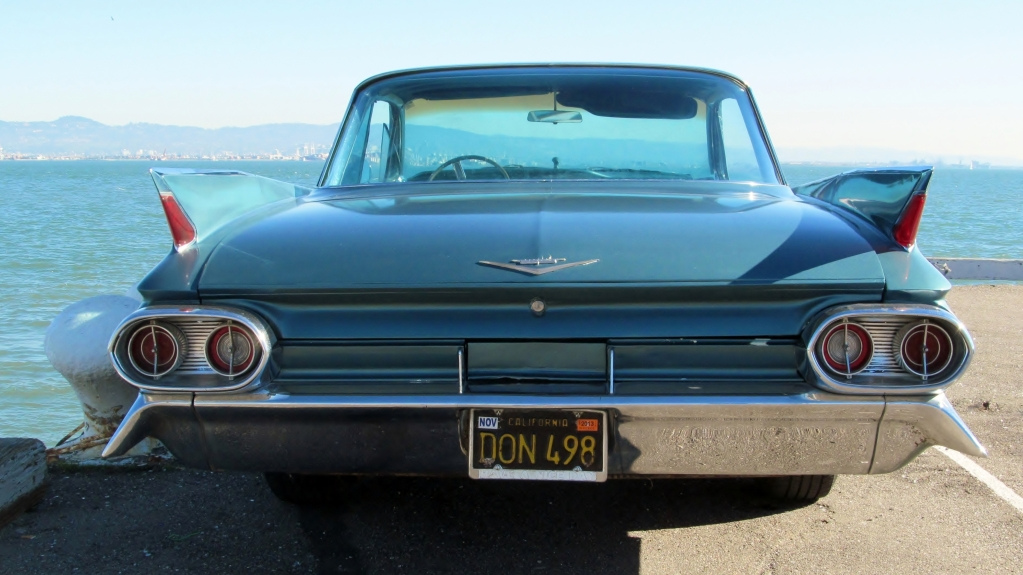Garold parked his ’61 Cadillac on our front lawn and the landlord didn’t like it. But Garold, who’d been sleeping on our couch, was a hard-drinking-hard-smoking-gonna-fill-the-room-with-left-hooks sailor and the landlord was too afraid to say anything to him. The Cadillac itself with those lethal fins had seen better days like every other car in the neighborhood except for the Schultz’s Volvo and Judge Wright’s Mercedes up the hill. The landlord finally mustered his courage and said something to Mom when she dropped off the check, and then Mom told Garold who just laughed… showing a space in front where a tooth used to live.
One day I came home from school pumping my stingray up the hill and Garold was changing the oil, the caddy’s hood propped open with a broomstick. He wore a cap of flattened Coors cans lovingly knitted together by my mom—craft days c.1971, and of course a cold one sweated on top of the caddy’s broad fender.
“I wanna show you something, feller,” he said. Lots of Garold’s words ended in er—Yucca was Yuccer, China was Chiner, on account of his upbringing on a foster farm in New Hampshire, the only one of six to reach high school, the Navy being his ticket out.
I parked my bike and walked over to the cavernous engine compartment. A case of Valvoline sat on the grass next to a new roll of toilet paper he’d use as an oil filter. How that worked I didn’t know.
What I did know was that he had righted our sinking ship. Dad had split with bleached blonde Nadine Lake in the family Bonneville and wasn’t sending any money home. It was the Mesopotamian period of divorce; everyone’s parents were doing it. Mom had met Garold at Point Mugu where she held the fort down, almost, as a civil service secretary. Now groceries from the Commissary filled our pantry, we made rent each month, and we had a Cadillac of indeterminate color—sort of faded purple sort of blanched grey on the front lawn. And sometimes Garold would let me street ride the Kawasaki 100 that he’d brought back from Japan on a Super Connie.
I peered under the caddy’s hood and Garold looked up. I noticed something was missing. The gap between his front teeth was gone and in its place was a shiny new tooth.
He grinned, wiped his hands with a rag. “Did it for your mom,” he said, getting a little emotional. “Couldn’t ask her to marry me looking the way I did.”
I nodded, unsure of what to say.
“We’re going to Bullhead City after work on Friday. They got a little chapel there.”
Garold looked at me, I had to say, somewhat hopefully. I was 13 and I did know something about that. And I realized, in his way, he was asking me for my mom’s hand in marriage. Or something like that. He lit a Tareyton and showed me the gold band he’d bought in a small white box stashed in his coveralls.
When Friday came, he slipped me a 50 and quickly looked away; it made him almost cry a little whenever he gave us anything. The folding money was for me to take care of the house and my younger sis and the two strays I’d brought home from the park the week before, while they were gone. And old Pom Pom was right next door.
Mom and Garold took off. She smiled and waved from the window. It was good to see her happy. But I felt myself missing something—missing her maybe, missing the family we’d once had with Dad, like this was the final nail in the coffin though Dad himself had already seen to that, and maybe missing that giant ’61 Cadillac too, with its massive lethal fins, as I stared at four depressions left by its wheels on our dandelion lawn.
